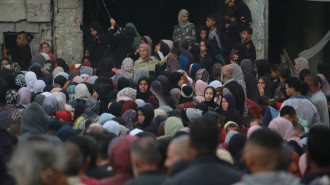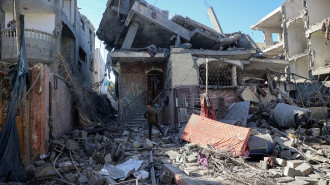Middle Eastern cities record highest temperatures in the world in one day
Several countries in the Gulf and Iran recorded the highest temperatures in the world on Saturday, as a new heat wave rolled over the Middle East and Europe.
Cities in Iraq, Kuwait and Oman topped the list of hottest cities across the world on 18 June, registering temperatures ranging between 49 and 50.4 degrees Celsius. The highest temperature, 50.4 degrees Celsius, was recorded in the city of Amarah in the Iraqi marshes, followed by several cities in Iran.
Middle East Heat Wave:Today 18 June The UAE rose to 49.8C,while Iran yesterday returned >50C. Very hot nights as well: 37.4C of Min. Temperature at Hoseyniyeh and today of 35.0C at Iranshar (591m asl). Temperatures will rise further next days with peaks of 51C-52C. pic.twitter.com/Eh6d57z09q
— Extreme Temperatures Around The World (@extremetemps) June 18, 2022
Europe has also been paralysed for days by an exceptional heatwave that "made history", climate experts say. Temperatures were above 40 degrees in certain locations, far beyond June averages.
(5) Today 18 June has made history in Europe.
— Extreme Temperatures Around The World (@extremetemps) June 18, 2022
First 35C of the year also in Benelux with 35.7C at Chievres in Belgium and 35.2C at Remich,Luxembourg.
First >35C also in the Czech Republic at Doksany,much hotter tomorrow. Another carnage of records is expected tomorrow.Stay tuned. pic.twitter.com/WVgf7YygOM
The scorching heat sparked devastating fires in Spain, where firemen have been battling dozens of simultaneous wildfires in the Catalunya region for five consecutive days.
Climate scientists have warned for years of the destabilising impact of human industrial activity on the earth's climate. Industrial activity and transportation release huge volumes of carbon (CO2) in the atmosphere, leading the atmosphere to warm significantly and upsetting natural climate mechanisms.
Recent reports by the Intergovernmental Panel on Climate Change (IPCC), a UN panel of scientists and experts, outline a bleak future for the Middle East region if world leaders don't act now to curb carbon emissions.
Climate experts say the Middle East is set to become hotter, drier, and increasingly exposed to natural hazards like sandstorms, flash floods and mudslides, that could make parts of the region unliveable.







 Follow the Middle East's top stories in English at The New Arab on Google News
Follow the Middle East's top stories in English at The New Arab on Google News


